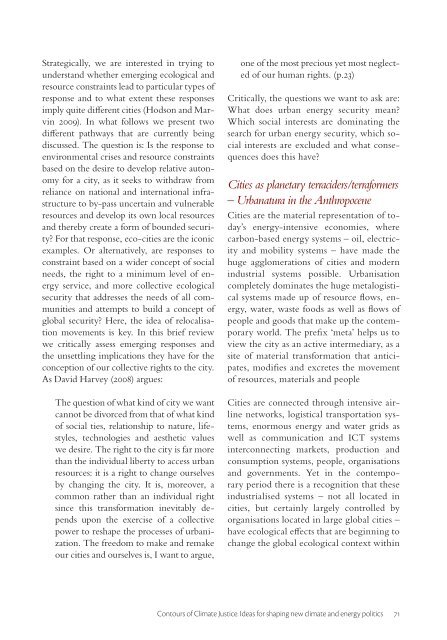Contours of Climate Justice - Dag Hammarskjöld Foundation
Contours of Climate Justice - Dag Hammarskjöld Foundation
Contours of Climate Justice - Dag Hammarskjöld Foundation
Create successful ePaper yourself
Turn your PDF publications into a flip-book with our unique Google optimized e-Paper software.
Strategically, we are interested in trying to<br />
understand whether emerging ecological and<br />
resource constraints lead to particular types <strong>of</strong><br />
response and to what extent these responses<br />
imply quite diff erent cities (Hodson and Marvin<br />
2009). In what follows we present two<br />
diff erent pathways that are currently being<br />
discussed. The question is: Is the response to<br />
environmental crises and resource constraints<br />
based on the desire to develop relative autonomy<br />
for a city, as it seeks to withdraw from<br />
reliance on national and international infrastructure<br />
to by-pass uncertain and vulnerable<br />
resources and develop its own local resources<br />
and thereby create a form <strong>of</strong> bounded security?<br />
For that response, eco-cities are the iconic<br />
examples. Or alternatively, are responses to<br />
constraint based on a wider concept <strong>of</strong> social<br />
needs, the right to a minimum level <strong>of</strong> energy<br />
service, and more collective ecological<br />
security that addresses the needs <strong>of</strong> all communities<br />
and attempts to build a concept <strong>of</strong><br />
global security? Here, the idea <strong>of</strong> relocalisation<br />
movements is key. In this brief review<br />
we critically assess emerging responses and<br />
the unsettling implications they have for the<br />
conception <strong>of</strong> our collective rights to the city.<br />
As David Harvey (2008) argues:<br />
The question <strong>of</strong> what kind <strong>of</strong> city we want<br />
cannot be divorced from that <strong>of</strong> what kind<br />
<strong>of</strong> social ties, relationship to nature, lifestyles,<br />
technologies and aesthetic values<br />
we desire. The right to the city is far more<br />
than the individual liberty to access urban<br />
resources: it is a right to change ourselves<br />
by changing the city. It is, moreover, a<br />
common rather than an individual right<br />
since this transformation inevitably depends<br />
upon the exercise <strong>of</strong> a collective<br />
power to reshape the processes <strong>of</strong> urbanization.<br />
The freedom to make and remake<br />
our cities and ourselves is, I want to argue,<br />
one <strong>of</strong> the most precious yet most neglected<br />
<strong>of</strong> our human rights. (p.23)<br />
Critically, the questions we want to ask are:<br />
What does urban energy security mean?<br />
Which social interests are dominating the<br />
search for urban energy security, which social<br />
interests are excluded and what consequences<br />
does this have?<br />
Cities as planetary terraciders/terraformers<br />
– Urbanatura in the Anthropocene<br />
Cities are the material representation <strong>of</strong> today’s<br />
energy-intensive economies, where<br />
carbon-based energy systems – oil, electricity<br />
and mobility systems – have made the<br />
huge agglomerations <strong>of</strong> cities and modern<br />
industrial systems possible. Urbanisation<br />
completely dominates the huge metalogistical<br />
systems made up <strong>of</strong> resource fl ows, energy,<br />
water, waste foods as well as fl ows <strong>of</strong><br />
people and goods that make up the contemporary<br />
world. The prefi x ‘meta’ helps us to<br />
view the city as an active intermediary, as a<br />
site <strong>of</strong> material transformation that anticipates,<br />
modifi es and excretes the movement<br />
<strong>of</strong> resources, materials and people<br />
Cities are connected through intensive airline<br />
networks, logistical transportation systems,<br />
enormous energy and water grids as<br />
well as communication and ICT systems<br />
interconnecting markets, production and<br />
consumption systems, people, organisations<br />
and governments. Yet in the contemporary<br />
period there is a recognition that these<br />
industrialised systems – not all located in<br />
cities, but certainly largely controlled by<br />
organisations located in large global cities –<br />
have ecological eff ects that are beginning to<br />
change the global ecological context within<br />
<strong>Contours</strong> <strong>of</strong> <strong>Climate</strong> <strong>Justice</strong>. Ideas for shaping new climate and energy politics 71
















